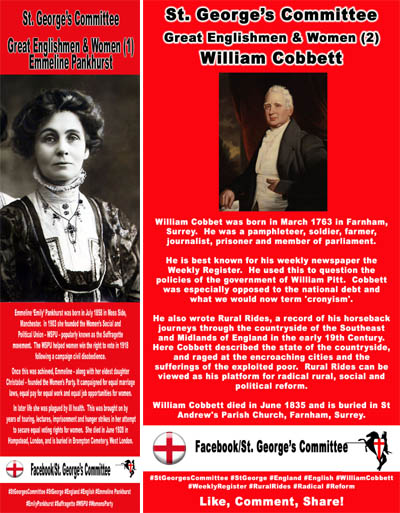From The Liberty Wall – St. George’s Committee – Great Englishmen & Women
.
From The Liberty Wall – St. George’s Committee – Great Englishmen & Women
 THE ST. GEORGE’S COMMITTEE (SGC) is an Anglocentric movement. Its main task is to preserve, protect and promote English history, heritage, traditions, identity and culture.
THE ST. GEORGE’S COMMITTEE (SGC) is an Anglocentric movement. Its main task is to preserve, protect and promote English history, heritage, traditions, identity and culture.
One would have thought that this would be a relatively easy task – yet Anglophobia seems to rule the roost. Anglophobia is where the establishment seems to portray any pride in England and the English in a wholly negative and derogatory manner.
Anglophobia seems to be on the increase, especially since the EU referendum where millions of white working class English folk stuck two fingers up the the British establishment and voted for Brexit. The fact many English working class citizens of colour also voted Leave is ignored as it doesn’t fit the Remain narrative.
Since then, it’s almost the ‘in thing’ to view ever single Englishman and woman as a knuckle-dragging racist and reactionary bigot. Indeed, many English Advocates say that establishment Anglophobia is so intense that it borders on institutionalised racism.
So how can English Advocates kick back against this form of Anglophobia?
One way is to promote a positive Anglocentric point of view. And this is what the SGC has been doing with a new series entitled Great Englishmen & Women. As its name suggests, it looks at well-known Englishmen and women to see if anything can be learnt from their lives. The SGC regards all of these folks as a ‘point of reference’ in that they’ve said or have done things that English Advocates will find of interest.
The Great Englishmen & Women series kicked off first with Emmeline ‘Emily’ Pankhurst and then William Cobbett. As can be seen from the above artwork, the SGC provides a brief potted history of Pankhurst:
Emmeline ‘Emily’ Pankhurst was born in 1858 in Moss Side, Manchester. In 1903 she founded the Women’s Social and Political Union – WSPU – popularly known as the Suffragette movement. The WSPU helped women the right to vote in 1918 following a campaign of civil disobedience.
Once this was achieved, Emmeline – along with her eldest daughter Christabel – founded the Women’s Party. It campaigned for equal marriage laws, equal pay for equal work and equal job opportunities for women.
In later life she was plagued by ill health. This was brought on by years of touring, lectures, imprisonment and hunger strikes in her attempt to secure equal voting rights for women. She died in June 1928 in Hampstead, London, and is buried in Brompton Cemetary, West London.
And the St. George’s Committee has this to say about William Cobbett:
William Cobbett was born in March 1763 in Farnham, Surrey. He was a phamphleteer, soldier, farmer, journalist, prisoner and member of parliament.
He is best known for his weekly newspaper the Weekly Register. He used this to question the policies of the government of William Pitt. Cobbett was especially opposed to the national debt and what we would now term ‘cronyism’.
He also wrote Rural Rides, a record of his horseback journeys through the countryside of the Southeast and Midlands of England in the early 19th Century. Here Cobbett described the state of the countryside, and raged at the encroaching cities and the suffering of the exploited poor. Rural Rides can be viewed as his platform for radical rural, social and political reform.
William Cobbett died in June 1835 and is buried in St Andrew’s Parish Church, Farnham, Surrey.
As we noted earlier, in certain circles, Anglophobia is rife. However, the enemies of England and the English (and particularly the enemoes of ordinary working English families) cannot disguise the fact that that both Pankhurst and Cobbett were both very progressive in outlook and active social reformers. Indeed, this year marked the 100th anniversary of women’s suffrage whereby women in the UK received the right to vote. Cobbett was a passionate defender of the freedom of the press – something that English Advocates should take note of, especially given the ongoing attempts – all in the name of fighting ‘hate
speech’ – to censor Social Media.
We understand from the St. George’s Committee that Florence Nightingale will feature next. Nightingale was another English social reformer, statistician and the founder of modern nursing.
Date: October 7, 2018
Categories: Liberty Wall































